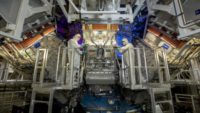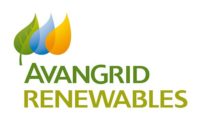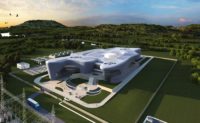NuScale Power LLC, an industry-leading developer of advanced nuclear small modular reactor (SMR) technology that is majority owned by Fluor Corp., said Dec. 14 it would go public in a merger with a NASDAQ-traded special purpose investment firm, in order to boost growth and project funding.
The deal with Spring Valley Acquisition Corp., set to close at the start of the second quarter 2022, would create a company valued at $1.9-billion with Fluor’s stake set at 60%, down from 80%. It will be traded under the ticker symbol SMR. The company has been a stakeholder of NuScale since its $30-million investment in 2011.
Under the transaction, the combined company would gain up to $413 million in gross cash proceeds, including from new investors, and be renamed NuScale Power Corp., according to Portland, Ore.-based NuScale, which licensed the technology from Oregon State University.
Market Push
The transaction will accelerate NuScale’s market push, Fluor Chairman Alan Boeckmann told ENR in an interview, and “allow a more varied investor base.” He said Fluor will continue to provide engineering services, project management and supply chain support and be NuScale's exclusive builder.
Boeckmann did not indicate if or when the contractor would further reduce its stake. "We intend to stay a significant investor," he said.
Investors and project partners tied to NuScale include Doosan Heavy Industries and Construction, Samsung C&T Corp., JGC Holdings Corp., IHI Corp, Enercon Services Inc., GS Energy, Sarens and engineering firm Sargent & Lundy. They have invested about $193 million.
TerraPower LLC, the design startup backed by Microsoft founder Bill Gates, has chosen to build a demonstration of its 345-MW Natrium advanced nuclear reactor in Kemmerer, Wyo., near a two-unit coal-fired plant that is set to close in 2025, the firm said Nov. 17, citing an estimated $4-billion project cost.
But NuScale's advanced SMR technology is the only modular design that has received U.S. Nuclear Regulatory Commission standard design approval for a 50-MW reactor module, which was given last year after also passing a safety review. The firm plans to seek similar approval for a larger version of the reactor.
NuScale has gained about $1.3 billion in financial backing to fund design and supply chain development to fabricate reactor modules, including more than $600 million from Fluor and $500 million from the US Energy Dept.
Building Prototypes
Fluor's Boeckmann said NuScale will have reactor module fabrication sites in North America, Korea and Japan, but did not disclose locations or supply chain partners. He said the firm has been “building prototypes and performance testing in the last year.”
Boeckmann said unlike building traditional nuclear power plants, SMR civil construction can be done simultaneously with design, expediting operations start. "Old nuclear plants never finished design when they went into construction," he said. "This is totally different. The design already is approved."
NuScale’s power plant design, recently renamed VOYGR, can be used for four, six and 12-unit modules that can provide up to 924 MW per day of power, the firm says.
"NuScale’s reactors are designed to safely shut down in an emergency and self-cool, indefinitely, with no need for operator or computer action, power or the addition of water – a first for any commercial nuclear power plant" the company says, adding that intellectual property supporting its technology "is protected by more than 600 granted or pending patents."
Despite NRC design and safety approvals, the NuScale reactor will need an NRC combined construction and operating license (COLA) for every project. That process, which could take up to 2.5 years, is already under way for construction of a six-unit plant using 77-MW NuScale reactor modules for regional utility Utah Associated Municipal Power Systems.
The estimated 452-MW project anticipates construction start by 2024 at the DOE Idaho National Laboratory and is set to operate by 2029. It is part of a DOE program to reduce greenhouse gas emissions by using nuclear power to support intermittent renewable energy.
The project has faced delays and was scaled back last year from an original 12 units. The Union of Concerned Scientists also has raised concerns about safety and cost issues of the NuScale design and other advanced nuclear reactors.
Expanded Possibilities
Boeckmann noted government support to NuScale's SMR development since the Obama administration, emphasizing that “renewables don’t have the reliability factor, and that nuclear power "is a great complement. You need baseload power for the grid.” The NuScale reactor design generates less waste and the Idaho project will have onsite waste storage for 60 years.
NuScale has about 19 agreements to develop or explore SMR power plants in 11 countries, with one in Romania set to operate by 2028, and others planned in Poland. That country is one that agreed, along with others at the COP26 climate conference in Scotland last month, to phase out construction of coal-fired power facilities.
Boeckmann noted a number of Japan-based investors in NuScale's technology, contending that it may help to "turn around" the country's ban on nuclear power construction in place since the Fukushima nuclear plant disaster in 2011.
“Now is the right time to accelerate and expand our efforts to bring our trailblazing SMR technology to more customers around the world," said NuScale President and CEO John Hopkins, a former Fluor executive who has been in those roles since 2012 and would remain in the combined firm.
Th merger agreement "should bring fresh capital, reducing cash burn and providing public price discovery of NuScale's intrinsic value where investors have generally attributed only modest value," said Andrew Wittmann, senior construction sector analyst at Robert W. Baird & Co. Equity Research. "At minimum, decreased cash usage is a positive." He said the deal "reduces Fluor's cash commitment and assigns a high intrinsic value to NuScale."






Post a comment to this article
Report Abusive Comment